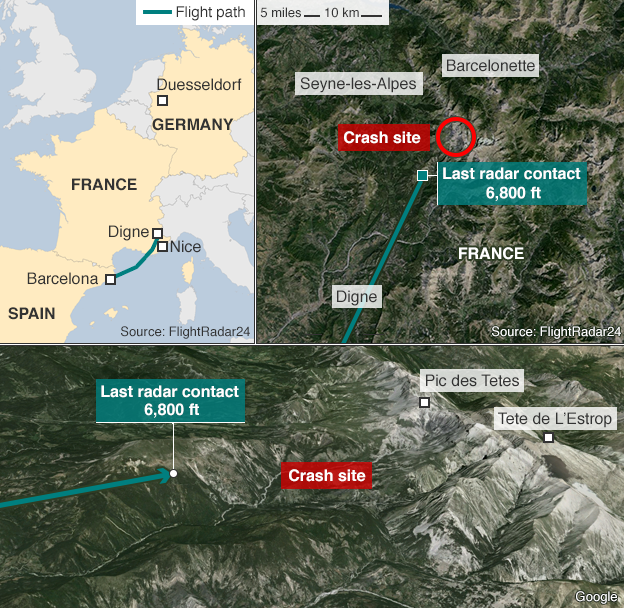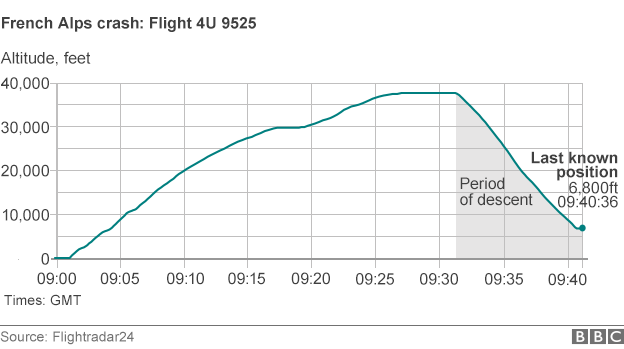Germanwings plane crash: Black box 'has usable data'
- Published
Air accident investigator Remi Jouty: "We just succeeded in getting an audio file"
French investigators say usable data has been extracted from the cockpit voice recorder of Germanwings 4U 9525 but it has so far yielded no clues as to the cause of the plane's crash.
They said the plane hit the ground in the French Alps at great velocity, suggesting no explosion in flight.
Flight 4U 9525 from Barcelona to Duesseldorf crashed after an eight-minute rapid descent on Tuesday.
The French, German and Spanish leaders visited the crash site on Wednesday.
Remi Jouty, the director of the French aviation investigative agency, said there were sounds and voices on the cockpit voice recorder but that it was too early to draw any conclusions.
Francois Hollande, Angela Merkel and Mariano Rajoy spoke after visiting rescue workers
He said he hoped investigators would have the "first rough ideas in a matter of days" but that the full analysis could take weeks or even months.
But the New York Times quoted, external an unnamed investigator as saying that one of the pilots had left the cockpit and had been unable to get back in.
"You can hear he is trying to smash the door down," the investigator adds, describing audio from the recorder.
There had been earlier reports that the second black box - the flight data recorder - had been found. But Mr Jouty said this was not the case.
'Flying to the end'
Mr Jouty said the plane's last communication was a routine one with air traffic control.
The plane confirmed instructions to continue on its planned flight path but then began its descent a minute later.

Analysis by Richard Westcott, BBC Transport Correspondent
The "black box" cockpit voice recorder is pretty battered but the devices are bomb-proof, literally, so investigators should still be able to listen to what happened on board.
The large, orange cylindrical part in the middle holds the memory boards that record the pilots' voices, and that looks intact to me.
Richard Westcott reports from a 'black box' investigation centre in the UK
The critical question now is, were the pilots speaking during those lost eight minutes when the aircraft dropped from 38,000ft to the ground?
If they're quiet, investigators will know they were unconscious, and that suggests a major decompression took place on board. That's when a hole in the fuselage lets all the air out. It's not necessarily fatal, if the pilots can get their oxygen masks on in time, something they train for, but if they were knocked out, it would explain the lack of a mayday call or any obvious attempt to steer the stricken aircraft to the nearest runway.

Mr Jouty said controllers observed the plane beginning to descend and tried to get back in contact with the pilots but without success.
He ruled out an explosion, saying: "The plane was flying right to the end."

Mr Jouty said: "At this stage, clearly, we are not in a position to have the slightest explanation or interpretation of the reasons that could have led this plane to descend... or the reasons why it did not respond to attempts to contact it by air traffic controllers."
Meanwhile, the BBC's Lucy Williamson in Seyne-les-Alpes says there are now reports that bodies are being recovered and airlifted from the site.
'Shoulder to shoulder'
Germanwings chief Thomas Winkelmann said 72 of the 144 passengers were German citizens. The victims included 16 pupils returning from an exchange trip. Spain's government now says 51 of the dead were Spanish.
UK Foreign Secretary Philip Hammond confirmed that three Britons were on board. Other victims were from Australia, Argentina, Iran, Venezuela, the US, the Netherlands, Colombia, Mexico, Japan, Denmark and Israel.
However, there may be some duplication because of dual citizenship.
"You get a sense of how secluded and remote the area is and how difficult it will be for rescue services"
Aerial footage showed the site of the crash in the Alps - courtesy BFM TV
Earlier, French President Francois Hollande, German Chancellor Angela Merkel and Spanish Prime Minister Mariano Rajoy gave a press conference after visiting the site of the crash.
Mr Hollande told his counterparts: The French people are here shoulder to shoulder with you during this ordeal. Everything will be done to find, identify and hand back to the families the bodies of their loved ones."
Both he and Mrs Merkel said they would do everything they could to find the cause of the crash.
In a press briefing later, Carsten Spohr, CEO of Lufthansa, which owns Germanwings, said this was "the darkest hour of 60 years of Lufthansa".
He added: "We cannot understand how an airplane in perfect technical condition with two such trained pilots was involved in such a terrible accident."
Lufthansa will operate two flights on Thursday to take relatives to France.
However, a bus with 14 relatives of Spanish victims left Barcelona on Wednesday for the crash area, because they did not want to fly.

At the scene: James Reynolds, BBC News, Seyne les Alpes
French gendarmes here have taken over a large part of this valley on the outskirts of town. One van with sirens escorted in a white trailer bearing the words "Mobile Criminal Investigation Laboratory".
Emergency workers in fluorescent jackets say that they want to work as quickly as they can.
"We cannot leave the victims a week in the mountains," said Roy Xavier from Civil Security.
But victims' families will have a long wait for the bodies to be returned to them. The Prosecutor of Marseille told reporters that it may be several weeks before all the victims are identified.

